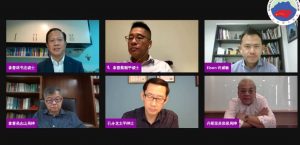KUALA LUMPUR: With our economy has been greatly devastated by the Covid-19 pandemic, the Federation of Chinese Associations Malaysia (Huazong) has implore the government to be more emphatic and considerate towards the plight of the taxpayers, business operators especially, and to go easy on them next year when comes to tax collection.
Its President Tan Sri T.C Goh said with our economy having significantly contracted this year, and is currently in a ‘winter’ stage, coupled with a deficit budget projected for next year, the government should hence be more considerate and flexible towards the taxpayers, especially those with good track records all these years.
“Following the devastating impact of the pandemic, which has persisted for close to a year now, tens of thousands of businesses and companies have either closed down or are currently struggling to stay afloat, operating in heavy losses. Hence, how could these badly affected businesses afford to pay corporate taxes next year?” he said.
T.C who is also the President of The Federation of Chinese Associations Sabah (FCAS) expressed this while officiating at the online forum on Budget 2021 organised its Economy and Trade Bureau, today. The said online forum was sponsored by Nippon Paint and Bay Suites, and it featured notable speakers like Datuk Goh Chee San, Dato’George Lim, and LL Koong, besides T.C himself. The Organising Chairman for the event is Datuk Chua Soon Ping, who is also Vice President of FCAS cum its Economy and Trade Bureau chief.
T.C said while the government had in the last few months rolled out a series of stimulus aid programs, such as wage subsidy program, loan moratorium, low or zero interest financing, stamp duty exemption etc, to assist the business sector, it nonetheless failed to reduce the existing corporate tax rate of 24%, when tabling the Budget 2021, which was a major letdown for the business sector.
“Not only that, the government has even raised its target for tax collection, next year. Finance Minister Tengku Datuk Seri Zafrul Tengku Abdul Aziz has issued circular to Inland Revenue Board (IRB) to step up efforts to achieve the new tax collection target of RM143.9 billion for next year, as compared to RM127 billion, this year,” he said.
Besides this, the Finance Minister also revealed that the government would introduce a new tax regime to cover those in the “shadow economy” or “underground economy” which constitutes 20% of the GDP. This means that the IRB will intensify its tax collection effort including tightening its auditing, especially targeting those who commit tax evasion or failed to submit tax returns. T.C thus urged business operators and entrepreneurs to take serious note of this new development, and to strive to ensure a proper account keeping, so as not to get into trouble, later.
He also opined that the government seemed to be over optimistic when it projected a growth rate of between 6.5 per cent to 6.7 per cent for next year, when the projected deficit is at 5.4%, with a projected total expenditure of RM322.5 billion and a projected revenue of RM236.9 billion.
“It’s also uncertain when the pandemic will be over. Furthermore, even if it is well under control, it will still take some time for the economy to fully recover,” he said.
He noted that the RM322.54 billion 2021 Budget unveiled by the government which constitutes 20.6% of the GDP, which is 10.6% higher than last year’s Budget, is the biggest budget in history. Out of this figure, government expenditure takes up RM236.5 billion or 73.3% of the total budget; meanwhile, the development expenditure is RM69 billion or 21.4% of the budget. Besides this, the government also allocated RM17 billion for the Covid-19 fund, which constitutes 5.3% of the total budget.
He highlighted that, as compared to this year, the government has reduced its operating expenditure by 1.9% while increasing its development expenditure by 23.2%. He described such an adjustment as a positive trend which indicated the government’s commitment to stimulate the economy by increasing spending on developments, at the same time scaling down on its administration.
He also opined that, besides exploring new sources of revenue, the government should also be more prudent with its financial management during this pandemic-induced economic crisis, besides rolling out “smart-and-practical” measures to support and assist the business sector to keep the economy going.
Meanwhile, Chua in his speech said, despite the devastating impact of the pandemic, he was nonetheless optimistic of the outlook of the state economy next year, citing three key factors namely, increase in oil palm prices, oil royalty payment for the state, and the imminent positive economic effects of Malaysia signing of the Regional Comprehensive Economic Partnership (RCEP) agreement, recently.
He noted that the price of crude palm oil recently reached RM3,400 per metric ton, a record high in the last eight years. He was thus optimistic that Sabah being the largest oil palm producing state in the country, coupled with the expected substantial oil royalty payment by the Federal government, the state economy will get a good boost, next year.-pr/BNN







